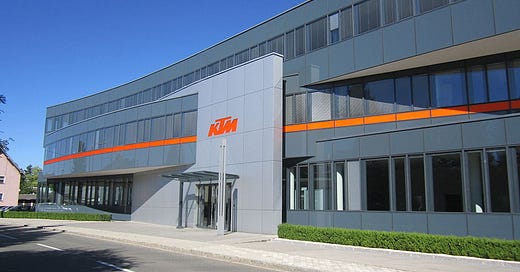Economic Pressure
Austria's economic malaise is hitting its industrial and retail sectors. Coalition negotiators now need to agree on what to do about it
Servus!
The start of a new month brings with it a new batch of economic data. Inflation in November ticked up only slightly from 1.8 percent in October to 1.9 percent year-on-year—still under the 2 percent benchmark set down by the European Central Bank, which is good news. On the other hand, the economy shrank by 0.6 percent year-on-year in the third quarter of 2024, and the unemployment rate now stands at 7.1 percent—up from 6.1 percent in November 2022 and 6.5 percent in November 2023. 384,000 people are currently out of work, 80,000 of whom are in further training or education.
The COVID-19 pandemic, the international supply side crisis, and Russia’s invasion of Ukraine created a series of pressures from rising energy prices and the cost of labor to supply chain breakdowns that have hit Austria’s industrial sector especially hard. In recent days, the German auto industry supply firm Schaeffler announced it would close one of its plants in Lower Austria with the loss of 460 jobs, while the Austrian motorbike manufacturer KTM has gone into insolvency, putting 3,600 jobs on the line. Things aren’t much better in the retail sector. The furniture store Kika/Leiner has gone into administration for likely the final time; 1,400 jobs will probably go there.
With six consecutive quarters of negative growth behind it, the Austrian economy is now in a really tough spot. In 2023, Austria’s GDP shrank by 1 percent, and this year, the Austrian Institute of Economic Research (WIFO) projects it will contract by a further 0.6 percent—the first time since the War that the Austrian economy will have receded for two years in a row. The outlook for 2025 is that the economy will grow by 1 percent. However, per (WIFO):
A key assumption of this forecast is that foreign demand will pick up again in 2025, particularly from Germany. However, if demand for capital goods remains as weak as it currently is, Austria could enter a third year of recession. In this case, unemployment would rise more sharply than expected and private households' propensity to consume would remain subdued. Another risk to the euro area economy is that of too rapid fiscal consolidation, when European fiscal rules come into effect.
That last point relates to the view, WIFO adds, that “the budget deficit is increasingly moving away from a sustainable path, and not only because of the economic situation.” This is why budget consolidation has become the focus of coalition negotiations in Vienna between the conservative People’s Party (ÖVP), the Social Democratic Party (SPÖ), and the liberal NEOS. There would seem to be an agreement or acknowledgement on the part of all three parties that the budget deficit needs to be brought down over the life of this parliament to stabilize the country’s finances, especially if the economy doesn’t pick up as quickly as the new government might hope.
Right now, however, the three parties cannot seem to agree on the means. The ÖVP wants to institute a budget cap, bringing down the deficit by decreasing government spending as opposed to bringing in new taxes. The SPÖ, meanwhile, wants to institute both inheritance and wealth taxes to increase government income. The ÖVP is vehemently opposed, and last week, chancellor Karl Nehammer threatened to blow up coalition talks if the SPÖ persists with this demand. Coalition negotiators are set to report next week, December 12, on the areas about which they have been able to come to an agreement—and where there is still more work to do.
Bis bald!
Thank you for reading The Vienna Briefing. Nothing beats a personal recommendation; if you know someone who would be interested in reading this newsletter, consider sharing it with them today.
The Vienna Briefing is a reader-supported publication. Your one-time or monthly tips make my work on this newsletter possible and help keep it free for everyone.
Blue-Black In Styria
The FPÖ and ÖVP will begin negotiations this week over forming a coalition government in Styria. The far-right won elections in the state on November 24, capturing 34.8 percent of the vote, ahead of the ÖVP on 26.8 percent.
Rosenkranz Sits On Surrender Request
President of the Austrian parliament Walter Rosenkranz has failed to act on a request from state prosecutors in Vienna to lift three FPÖ MPs’ parliamentary immunity. Prosecutors reportedly suspect the three men may have violated Austria’s law prohibiting National Socialist activity and Holocaust denial.
Subway Returns To Full Service
Vienna’s U1 subway line came back online on Friday having been put out of action for over a week by a train that caught fire while underway between Taubstummengasse and Südtiroler Platz. As of Friday, the U2 will once more run between Karlsplatz and Schottentor following years-long renovation and modernization works.




